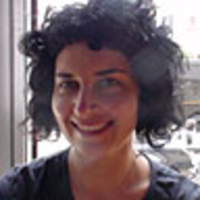
Viva Las Vegas’ Wednesday shift began at 4:45 in the afternoon. She climbed up to the stage in her Lucite heels, wearing a bright red kimono with her name sewn onto the back. Here at Mary’s Club—Portland’s oldest topless bar—the women only take off their clothes if there’s money on “the rack”—the name for the seats closest to the stage. Viva asked for a few dollars from the patrons for the jukebox.
Her first song was “Sunday Morning” by The Velvet Underground. She lay on her stomach and kicked up her heels. She stood and swayed, tapped her thighs and sang along. Her pixie haircut, a few months post-chemo, accentuated her ski-slope nose and flirty smile. After she finished her set and gathered the cash left on the rack, she smiled, made eye contact with the audience and cooed, “Thank you for supporting the arts.”
Viva started stripping 13 years ago, after she moved to Portland from Minnesota (by way of Williams College), where she grew up a preacher’s daughter. Last year, she felt she was approaching the end of her career. Time was taking its toll on her body. Then, she was diagnosed with breast cancer.
“I thought that putting bags of silicone into my body to alter my chest from the way fate had designed it was monkeying with reality.”
Her memoir, Magic Gardens, documents her journey from twenty-something stripper to activist and acolyte. It’s also the exploration of fantasy versus reality, apt subject matter for a stripper who found herself suddenly bald and missing a breast.
After her set, Viva threw on her kimono and sat down next to me as a younger woman teetered onto the stage. “I think she was born in the ‘90s,” Viva whispered, cocking her head toward the dancing girl.

Magic Gardens shows Viva at about that same age, when she became a local spokesperson for the sex industry after agreeing to debate a woman who claimed stripping fed the porn industry and led to violence against women. The debate occurred face-to-face at the offices of Portland’s alt-weekly The Willamette Week, which ran a photo of Viva on the cover. Soon the television stations came calling for interviews. Her notoriety led to roles in numerous indie films, including Gus Van Sant’s Paranoid Park and The Auteur by James Westby.
But her career was derailed last year, when her boyfriend found a small lump in her breast. They broke up in the early stages of her cancer treatment, an event Viva says was worse than the cancer—she had a plan for healing and doctors who would help, but no plan for getting over her heartbreak. She stopped stripping and struggled with how she’d make a living during and after the three-month treatment—a mastectomy and chemotherapy.
“I felt like a failure for being sick,” she said, deflating for a moment over her Irish coffee. “I come from a family of health nuts and athletes. Having my body attack itself from within definitely felt like a major failure, and I tended to blame myself for causing the illness.”
During her treatment, she disconnected from herself. “For much of that time I didn't inhabit my body as my own, as it was changing, healing and in between surgeries. I kind of separated myself from it, I think, and let it do its thing.”
After her unilateral mastectomy, the doctors stretched her skin for the reconstruction, and added extra skin from a cadaver, making her breast cold to the touch, though she didn’t notice her breast was icy until the first time she danced. During her first shifts back at Mary’s, she said, “The word ‘necrotic’ would pop into my head as I danced.”
Her skin became incurably itchy. “Doctors couldn’t help me so I went to a medical psychic,” she said with the slightest eye roll. The psychic told her she was longing for touch. She took a lover and the itching stopped immediately.
After dancing for a few weeks her breast warmed up. Still, she struggled with her new shape. She felt any sort of augmentation was insincere. “I thought that putting bags of silicone into my body to alter my chest from the way fate had designed it was monkeying with reality.”
For Viva, stripping is now business as usual, which is how she likes it. She’s been approached by nurses wanting their cancer patients to visit her at work. “I don't shy away from talking about it, and I have been able to grope more gals in the dressing room, now that I'm the resident expert on breast lumps,” she said.
“Do I feel beautiful?” she said. “I do on stage, when I'm expected to feel beautiful. That's stage magic for you.”
Plus: Check out Book Beast, for more news on hot titles and authors and excerpts from the latest books.
Melissa Lion is the author of two novels, Swollen and Upstream, both published by Random House. She blogs about her life as an SUV-driving, conventionally-grown food eating Californian living in Portland, Oregon at melissalion.com and tweets about being a bike-riding, canning, single mom as @melissalion.






